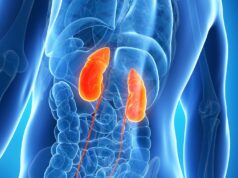
A “major breakthrough in kidney transplantation”—that is how imlifidase has been described in new French consensus guidelines on the drug’s use that have been published in Transplant International. The publication follows the 2020 conditional marketing authorisation of imlifidase by the European Medicine Agency (EMA), and represents an effort to build a “common framework” that establishes its benefits and tolerance in real-world care.
The working group behind the guidelines, led by Lionel Couzi (Centre Hospitalier Universitaire de Bordeaux, Bordeaux, France), was convened by the French Society of Transplantation (SFT), the French-speaking Society of Nephrology, Dialysis and Transplantation (SFNDT) and the French Society of Histocompatibility and Immunogenetics (SFHI). The group was composed of 12 transplant nephrologists and four immunologists, including two human leukocyte antigen (HLA) experts. They aimed to create consistency in practice through a set of recommendations on “patient selection, choice of antibody characteristics, treatment, and follow-up”.
The guidelines come just over a year after the publication in July 2022 of the UK National Institute for Health and Care Excellence (NICE) set out their own imlifidase guidance, which recommended the drug for those awaiting transplant who are highly sensitised to HLA. Those guidelines state that “people who are highly sensitised wait longer for a suitable donor kidney, and imlifidase can improve access to kidney transplantation”.
The guidelines build on two studies referenced by the French working group. Among these was a phase 2 study, in which the primary outcome of conversion of baseline positive cytotoxicity crossmatch (XM) to negative within 24 hours after imlifidase treatment occurred in 17 (89.5%) of 19 patients.
“Living-donor transplantation options are often limited, and most highly sensitised patients are transplanted with a deceased donor,” Couzi et al outline. They explain that imlifidase has been indicated in France to replace previous desensitisation treatment options for patients with a positive crossmatch against an HLA-incompatible deceased donor, and state that the EMA considers the drug to meet an unmet need for highly sensitised patients—though they note that “additional data on long-term graft function and survival are required”.
The new French guidelines recommend that patients selected for desensitisation with imlifidase have calculated panel reactive antibodies (cPRA) ≥98%, be ≤65 years of age, have spent ≥3 years on the waiting list, and be at a low risk of biopsy-related complications.
They also state that it is particularly important to select a donor profile that is at lower risk for delayed graft function, given their high antibody-mediated rejection rate (AMR). On the matter of associated therapies, it adds that patients must be given imlifidase as a single dose (0.25mg/kg, IV in 15 minutes) prior to transplantation after a premedication with glucocorticoids and antihistamines.
Other points of note in the guidelines include a recommendation against the use of imlifidase for transplantation in patients with a history of more than two kidney transplants. Patients themselves should also be made aware of the full implications of desensitisation, how it is performed, as well as both the expected benefits and risks.
The authors note that donor-specific antibodies (DSA) have been found to rebound “frequently with an increased risk of AMR” following transplantation with imlifidase. With a mind to limiting this risk, they also recommend “to only delist those with a single antigen flow bead (SAFB) mean fluorescence intensity (MFI) below 5,000” after a 1:10 dilution (one Lambda assay) (2D).
In their conclusion, Couzi et al describe imlifidase as “the first treatment authorised in our field since belatacept more than 10 years ago”, and state that it “could allow transplanting patients so far considered untransplantable”. They call their guidelines a “partly subjective […] international effort”, but say finally that more data from clinical trials will, in future, help in their revision and refinement.











